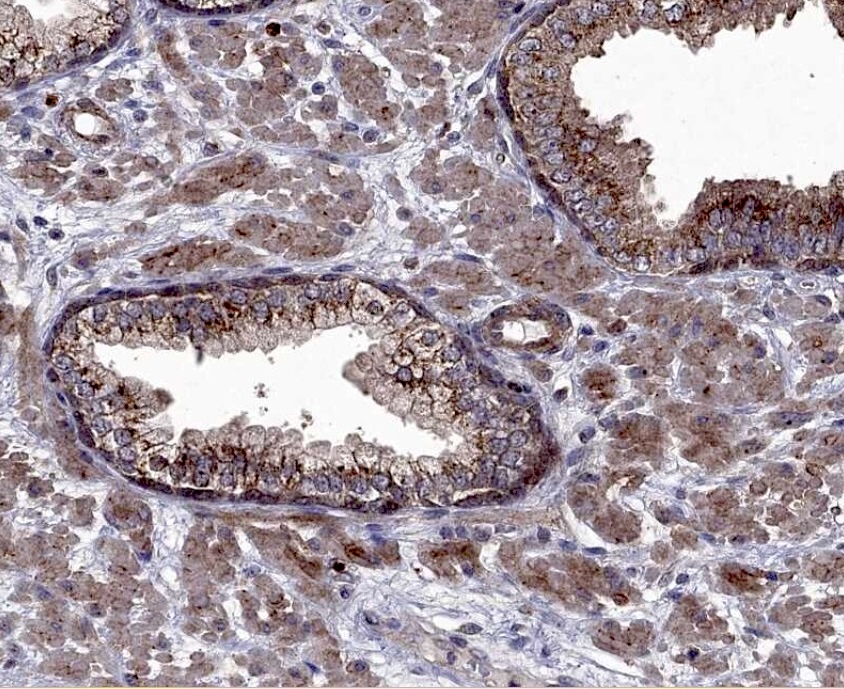Table of Contents
Definition / general | Essential features | Terminology | Pathophysiology | Diagrams / tables | Clinical features | Interpretation | Uses by pathologists | Prognostic factors | Microscopic (histologic) description | Microscopic (histologic) images | Positive staining - normal | Positive staining - disease | Negative staining | Molecular / cytogenetics description | Sample pathology report | Additional references | Board review style question #1 | Board review style answer #1 | Board review style question #2 | Board review style answer #2Cite this page: Wirth P. PTEN. PathologyOutlines.com website. https://www.pathologyoutlines.com/topic/stainspten.html. Accessed April 2nd, 2025.
Definition / general
- Phosphatase and tensin homolog
- Located on chromosome 10q23
- Transmembrane glycoprotein found on the surface of thymocytes, T lymphocytes and some B lymphocytes (B1a)
Essential features
- Tumor suppressor gene that is commonly lost in human cancer
- Second most frequently somatically mutated gene (~5%) (Cold Spring Harb Perspect Med 2019;9:a036293)
- Most frequently mutated gene in endometrial cancers (Physiol Res 2022;71:S125)
- Germline PTEN mutations cause hamartoma tumor syndrome (Cold Spring Harb Perspect Med 2019;9:a036293)
Terminology
- Phosphatase and tensin homolog
- PTEN-MMAC1 protein
- Mutated in multiple advanced cancers 1 (MMAC1)
Pathophysiology
- PTEN regulates PI3K / AKT pathway
- In the cytoplasm, PTEN acts to antagonize the PI3K / AKT pathway by dephosphorylating 3,4,5-triphophsate (PIP3) to phosphatidylinositol 4,5-disphospate (PIP2), suppressing the activation of AKT (Ak strain transforming, protein kinase B)
- In the nucleus, PTEN is involved in the maintenance of chromosome stability, DNA repair and cell cycle regulation (Cold Spring Harb Perspect Med 2019;9:a036293)
- PTEN can be inactivated by several different mechanisms including gene mutation, gene deletion, epigenetic silencing and microRNA regulation (Hum Pathol 2014;45:522)
- Loss of PTEN results in AKT activation, leading to increased growth, survival and altered metabolism of cancer cells (Int J Gynecol Pathol 2012;31:48)
Clinical features
- There is currently no specific targeted therapy for PTEN since its loss leads to hyperactivation of the PI3K / AKT / mTOR pathway; however, other inhibitors that target the PI3K / AKT / mTOR pathway may offer some benefit to patients
- May help pinpoint which patients with endometrial carcinoma (EC) will be responsive to therapy (Int J Gynecol Pathol 2012;31:48)
- Positive PTEN expression may predict breast cancer patient response to trastuzumab (HER2) therapy (Cold Spring Harb Perspect Med 2019;9:a036293)
- Poly ADP ribose polymerase (PARP) inhibitors may be useful in patients with mutant PTEN tumors (Hum Pathol 2014;45:522)
Interpretation
- Cytoplasmic, membrane and nuclear
Uses by pathologists
- Loss of nuclear PTEN expression in adenomatous thyroid nodules is sensitive and specific for Cowden syndrome (Am J Surg Pathol 2011;35:1505)
- PTEN status in conjunction with hormone receptor expression in breast cancer, such as HER2, can guide treatment strategies (D J Med Sci 2023;9:150)
- HER positive / PTEN negative tumors are associated with resistance to HER2 therapies
- PTEN loss can be used to differentiate endometrioid carcinoma from other types of carcinoma
Prognostic factors
- PTEN genomic deletions are associated with poor prognosis (Hum Pathol 2014;45:522)
- PTEN loss by FISH may be associated with increased risk for recurrence in prostate cancer and is associated with poor outcomes (Oncotarget 2017;8:65566)
- Associated with increased risk of fatal prostate cancer after radical prostatectomy, especially with ERG negative tumors (J Urol 2020;203:344, J Cancer Res Clin Oncol 2018;144:2117)
- qPTEN loss could help identify patients who may experience shorter biochemical recurrence free survival, regardless of ERG status (J Natl Cancer Inst 2020;112:1098)
- PTEN loss in triple negative breast cancer is associated with poor prognosis (D J Med Sci 2023;9:150)
- In colorectal cancer, high expression of PTEN is associated with a favorable prognosis (D J Med Sci 2023;9:150)
- PTEN loss with activated AKT is associated with lower survival rates in lung carcinoma (D J Med Sci 2023;9:150)
- PTEN loss may be associated with resistance against therapy with immune checkpoint inhibitors (Cancer Res 2023;83:2513)
Microscopic (histologic) description
- Benign tissues: PTEN typically shows a strong positive staining in the cytoplasm, membrane and sometimes in the nucleus of cells
- Cancerous tissues: PTEN expression can vary; however, reduced or absent staining in the nucleus and cytoplasm is common in many carcinomas
- There may be positive staining in surrounding benign stroma or in noncancerous cells
- Reference: Clin Cancer Res 2011;17:6563
Microscopic (histologic) images
Positive staining - normal
- Found in almost all body tissues
Positive staining - disease
- Adenomatous thyroid nodules: retained PTEN expression is typically seen in adenomatous nodules, while loss of PTEN is associated with Cowden syndrome (Cancers (Basel) 2023;15:1575)
- Most endometrial carcinomas show intact PTEN expression
- Primary colorectal cancers often retain PTEN expression (Cancer Med 2013;2:496)
Negative staining
- Significant percentage of malignancies show reduced or absent PTEN expression (Cold Spring Harb Perspect Med 2019;9:a036293)
- Glioblastomas (70% reduced or lost expression)
- More than 50% of prostate carcinomas exhibit loss of PTEN expression, which is often associated with gene deletion, mutations or epigenetic changes (J Urol 2020;203:344;J Cancer Res Clin Oncol 2018;144:2117)
- Sporadic colorectal cancers (60% reduced or lost expression)
- Acute myeloid leukemia (75% reduced or lost expression)
- Pancreatic carcinomas (50% reduced or lost expression)
- Complete loss of PTEN protein is more frequent in metastatic versus primary breast cancer (Hum Pathol 2014;45:522)
- PTEN loss is observed in 30 - 50% of sporadic endometrial carcinoma cases (Int J Gynecol Pathol 2012;31:48)
- Negative PTEN IHC is commonly found in tumors associated with Cowden syndrome (Am J Clin Pathol 2024;161:490)
- Loss of cytoplasmic PTEN may distinguish intraductal prostatic carcinoma (loss of PTEN) from high grade prostatic intraepithelial neoplasia (PIN) (positive for PTEN) (Am J Surg Pathol 2015;39:169)
Molecular / cytogenetics description
- PTEN gene is located on chromosome 10q23.31
- Many different types of PTEN mutations have been described (deletions, frameshift, missense, nonsense, etc.)
- PTEN mutations have been associated with several syndromes including Cowden, Bannayan-Riley-Ruvalcaba, Lhermitte-Duclos and Proteus-like (ScientificWorldJournal 2012;2012:252457)
- 10 - 30% of melanomas harbor a PTEN aberration (Cell Mol Life Sci 2012;69:1475)
Sample pathology report
- Endometrium, biopsy:
- Endometrioid carcinoma, grade 2 (see comment)
- Comment: The tumor exhibits glandular and solid growth patterns with moderate cytologic atypia. Immunohistochemical stains show wild type expression of p53, intact expression of mismatch repair proteins (MLH1, PMS2, MSH2, MSH6) and loss of PTEN expression. The findings are consistent with endometrioid carcinoma.
Additional references
Board review style question #1
How is PTEN staining used in the diagnosis of cancers?
- Loss of PTEN expression may help identify patients likely to respond to targeted therapies
- Positive PTEN expression predicts poor response to chemotherapy
- PTEN expression is only clinically relevant if expressed in cell nuclei
- PTEN loss indicates a better prognosis
Board review style answer #1
A. Loss of PTEN expression may help identify patients likely to respond to targeted therapies. PTEN mutations or loss of PTEN expression leads to uncontrolled activation of the PI3K / AKT / mTOR pathway, which promotes cancer cell growth and survival. While there is no specific therapy targeting PTEN itself, drugs targeting the PI3K pathway can counteract the effects of PTEN loss. Answer B is incorrect because positive PTEN expression typically indicates normal tumor suppressor function, and its loss, not its presence, is associated with more aggressive disease, poor prognosis and treatment resistance. Answer D is incorrect because PTEN loss is associated with a worse prognosis in many carcinomas due to its critical role as a tumor suppressor. Its loss leads to enhanced cancer cell growth, survival and invasion. Answer C is incorrect because while PTEN also has functions in the nucleus, such as maintaining genomic stability and regulating the cell cycle, its tumor suppressive role is not restricted to the nucleus. Normal expression of PTEN can occur in the nucleus and cytoplasm (see image above). PTEN loss in these areas can be associated with aggressive tumor behavior and poor prognosis.
Comment Here
Reference: PTEN
Comment Here
Reference: PTEN
Board review style question #2
What is the significance of PTEN loss in prostate cancer when detected by FISH?
- It indicates a better overall prognosis
- It is associated with an increased risk of recurrence and poor outcomes
- It may suggest a high grade prostatic intraepithelial neoplasia (PIN)
- It predicts sensitivity to hormone therapy
Board review style answer #2
B. It is associated with an increased risk of recurrence and poor outcomes. When PTEN is lost or mutated, the PI3K / AKT / mTOR pathway becomes dysregulated, promoting cancer cell proliferation and survival, which contributes to cancer progression, increased risk for recurrence and poorer outcomes in patients. Answer A is incorrect because PTEN loss is linked to higher grade tumors, more advanced stages and an increased risk of recurrence in prostate cancer. Answer D is incorrect because PTEN loss does not predict sensitivity to hormone therapy in prostate cancer. Hormone therapy (such as androgen deprivation therapy) targets the androgen receptor pathway, which is distinct from the PI3K / AKT pathway regulated by PTEN. Answer C is incorrect because PTEN loss is associated with prostate cancer progression, not benign conditions like high grade PIN, which does not typically exhibit PTEN loss.
Comment Here
Reference: PTEN
Comment Here
Reference: PTEN










